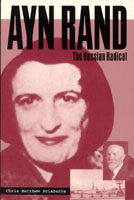Ayn Rand: The Russian Radical

Cover
|
|
| Author | Chris Matthew Sciabarra |
|---|---|
| Country | United States |
| Language | English |
| Subject | Ayn Rand, Objectivism |
| Publisher | Pennsylvania State University Press |
|
Publication date
|
1995 |
| Pages | 477 |
| ISBN | |
| OCLC | 31133644 |
| Preceded by | Marx, Hayek, and Utopia |
| Followed by | Total Freedom: Toward a Dialectical Libertarianism |
Ayn Rand: The Russian Radical is a 1995 book by Chris Matthew Sciabarra tracing the intellectual roots of 20th-century Russian-American novelist and philosopher Ayn Rand and the philosophy she developed, Objectivism.
The book is the second volume in a trilogy of books on dialectics and libertarianism. The Russian Radical explores Rand's college influences and intellectual roots—particularly the role of Rand's philosophy teacher, philosopher Nicholas Onufrievich Lossky—and argued that Rand's philosophical method was dialectical in nature.
Sciabarra was first introduced to Rand's ideas while in high school, but began serious study of her in relation to dialectical thinking while working on his doctoral degree at New York University. In 1984 he began a "systematic study of the dialectical aspects of Rand's philosophy," research that eventually led to the book.
Sciabarra had difficulty securing a publisher. As he described it ten years later, many academic presses were uninterested in publishing a book about Rand, while commercial presses were put off by the scholarly nature of the content. The book was eventually published by the Pennsylvania State University Press in August 1995. It is the second volume in a three-book series by Sciabarra called "Dialectics and Liberty", which he conceived while working on his dissertation. On account of publishing delays, its predecessor, Marx, Hayek, and Utopia, came out that same month.
In his introduction, Sciabarra briefly describes the difficulties facing the Rand scholar, then provides a quick overview of dialectics. Part One, "The Process of Becoming," examines Rand's intellectual development out of her Russian background. Chapter 1 describes the various currents in Russian philosophy during Rand's childhood and youth, including the views of the Slavophiles, of Vladimir Solovyov, of various literary figures of the Silver Age, and of Russian Marxists. Chapter 2 focuses on Lossky's teachings, which "exhibited a Russian proclivity to synthesize opposites and resolve antagonisms. He rejected the dualistic obsession with dichotomies of rationalism or empiricism, idealism or materialism, knowledge or existence. These alternatives were, for him, partial and incomplete. Like other thinkers in Russian philosophy, however, Lossky achieved the ultimate integration through a mystical Absolute." According to Sciabarra, Rand would join Lossky in rejecting all of these dichotomies, but did not accept his appeal to religious faith. In Chapter 3 discusses Rand's education at the Stoiunin Gymnasium, at a high school in the Crimea, and at Leningrad State University, where she majored in history. Chapter 4 surveys Rand's maturation as a thinker after she emigrated to the United States in 1926, taking on such controversies as whether she was in a "Nietzschean phase" when she wrote her first novel, We the Living.
...
Wikipedia
